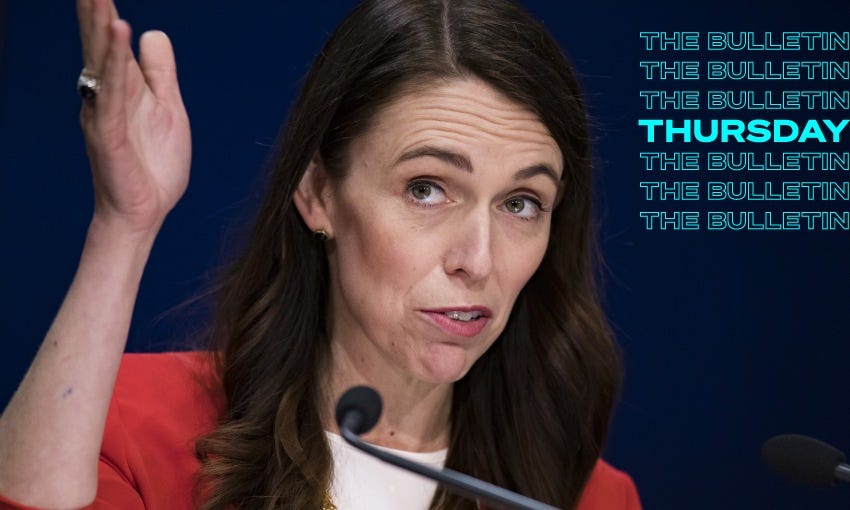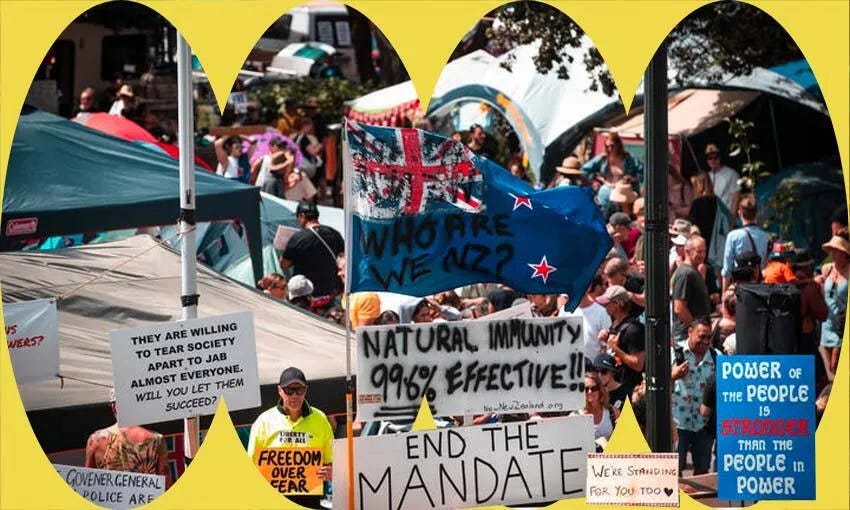The new normal
New Zealand is aiming for a sense of normalcy beyond the omicron peak with a set of looser Covid restrictions
Mōrena and welcome to The Bulletin for Thursday, March 24, by Justin Giovannetti. Presented in partnership with Z Energy.
In today’s edition: Heavy flooding for Tairāwhiti; building an Auckland that endures; the troubled GIB monopoly; but first, the country’s new Covid rules.
Jacinda Ardern announces changes to Covid rules. (Robert Kitchin/Getty Images)
Most Covid-19 rules scrapped as government adopts a pared-down traffic light system.
Jacinda Ardern unveiled loosened Covid restrictions yesterday that will roll out over the coming days. From Saturday morning, QR code scanning and outdoor gathering limits are gone—but keep the app for bluetooth. In early April, vaccine passes and most mandates end. The Spinoff’s live updates has summarised the announcement and the simplified traffic light system. Continued wearing of face masks indoors will do most of the heavy lifting for the Covid response going forward, along with boosters for the New Zealanders who haven’t had them yet. The prime minister said that while the country’s Covid response has been successful, it was “bloody hard”.
Some vaccine mandates will remain, companies can choose to require vaccination.
Health workers, people in aged care homes, Corrections staff, as well as border workers will remain covered by the government’s vaccine mandate. Teachers, soldiers and police will no longer need to get two doses by default. Those in the hospitality industry covered by mandates will also no longer need vaccines from April 5. 1News has looked more closely at the mandate decision and what it means for workers. A public health group chaired by Sir David Skegg advised the government that certain vaccine mandates could be dropped after omicron’s peak, which is why the mandates will remain until April. RNZ reports that schools have been told they can continue to require vaccines.
The reaction has been mixed, with disappointment at both ends of the spectrum.
Hospitality businesses told RNZ that the government is being too slow and didn’t go far enough. They said they want a move to the orange setting, along with the end to physical distancing rules. The government will review the traffic light setting on April 4. Retail NZ told Stuff it would like the mask rules revoked and worries staff will face aggression. National supported the move, but said the government should provide a timeline for dropping all mandates. Act said Ardern was too timid and the traffic light system should be abolished. The Green Party opposes the new rules and say they put vulnerable communities at risk. The prime minister acknowledged that Māori advisors were uncomfortable with the changes, 1News reports.
Disappointment from Siouxsie Wiles.
Over 500,000 New Zealanders have been confirmed Covid cases, but the actual number could be above 1.7 million according to modelling. The vast majority have occurred over the past month. Omicron has been an incredibly infectious virus and elimination now seems “impossible” anywhere in the world, according to associate health minister Ayesha Verrall. There will be future waves of Covid-19 and all of the measures being scrapped now could return. Here’s what Siouxsie Wiles told the Science Media Centre about yesterday’s changes:
“I'm relieved that not all of our protections have been dropped. The data from overseas is really clear—those countries that have dropped restrictions as their omicron wave was subsiding are now experiencing another wave. For that reason, I am relieved to see masks stay…
But, I am disappointed with parts of the announcement. There was a lot of talk of things being safer now Auckland is coming out of this omicron peak, but safer for who? Certainly not everybody. We know that being boosted helps reduce transmission of this virus so upgrading vaccine passes to include the booster would have helped keep indoor environments safer for the more at-risk members of our community. Similarly, removing vaccine mandates for people working with our children who can’t yet be vaccinated makes me very nervous.”
The Spinoff’s Covid data tracker has the latest figures.
The generous support of our members powers all of The Spinoff's journalism, including live updates, the award-winning collaborations between Toby Morris and Siouxsie Wiles, and richly reported feature writing.
As we continue to struggle against commercial headwinds, contributions from our members are more critical than ever. If you value what we do and have the means to do so, please make a donation today and support our mahi.
Heavy rain and devastating flooding for Tairāwhiti.
Evacuations continued for a second night around Gisborne as rivers peaked amid persistent heavy rain. The Dominion Post reports that residents have been warned to stay home and expect more rain. A state of emergency was declared yesterday and a number of roads have been closed by slips. Emergency crews are trying to figure out which roads remain safe for evacuations today.
How to make Auckland world class by 2070: Ask the kids.
Chris Schulz reports for The Spinoff on a provocative report that asks what Tāmaki Makaurau should look like in 2070. The report has nine key suggestions, including smoother transit, better tech and AI infrastructure, and far fewer cars. But there’s also a focus on the kids. The report calls for a commissioner for future generations, someone who can act as a voice for a younger generation that doesn’t see itself reflected on council. That generation wants a more diverse city, one that better services the areas it cares about and could leave if it doesn’t see itself better reflected in Auckland.
From our partners at The Mind Lab: For many, returning to study just isn’t an option when it means taking a break from earning, looking after the kids or working the extra hours involved with part-time study. Now The Mind Lab and Tech Futures Lab have created stackable micro-credential courses, which build into a Masters’ programme that works with your schedule. The programmes are catered to your values and experiences, whether you’re a small business owner, a stay-at-home parent or an industry professional. And it’s designed to provide knowledge that’s immediately practically applicable to your work place. Learn how to change your world with The Mind Lab and Tech Futures Lab today. (Sponsored)
The average household’s expenses will increase $150 a week.
ASB is warning that New Zealanders will need to find an extra $15 billion for expenses this year, or $150 per household. Interest reports that inflation is expected to make a major dent in the country’s budgets, eating up about 7% more of incomes. Most families will end 2022 poorer than they started it, the bank warned. Speaking in Auckland, the finance minister said the country would face a challenging year. However, as Stewart Sowman-Lund reports from Grant Robertson’s speech, the minister ruled out significant tax cuts for lower income New Zealanders. Robertson said a cut to GST, a deeply regressive tax, wouldn’t happen because he wants to avoid a debate about the difference between beetroot and canned beetroot.
Why the troubled GIB monopoly still stands.
New Zealand’s plasterboard market is a perfect example of what ails some parts of the country’s economy. Fletcher Building’s GIB holds 95% of the plasterboard market and that’s become a big problem over the past two years. Newsroom explores how a Covid slowdown means you couldn’t get GIB before July if you ordered today. Competitors who could serve you a similar, maybe even better product and much sooner, often can’t because of consenting rules.
A month after invading Ukraine, Russian forces face exhaustion.
The first Russian missiles were still striking Ukraine a month ago when I spoke with Robert Patman, an international studies expert at the University of Otago. Most of our interview made it into The Bulletin, but there’s one line I didn’t run. “Don’t underestimate them, the Ukrainians will fight like hell,” Patman told me. I didn’t want to seem too optimistic about the Ukrainian fight. That was wrong.
I committed a sin that day that many analysts have in the past month. We underestimated Ukraine. Much analysis has warned that the Ukrainian defenders can’t hold out against the largest army in Europe indefinitely. Well, they might. Retired Australian army major general Mick Ryan explains to the ABC that Russia is likely at the point where it can no longer attack.
Got some feedback about The Bulletin, or anything in the news? Get in touch with me at thebulletin@thespinoff.co.nz
Toby Manhire looks at how the end-the-mandate crowd responded to the ending of mandates. Josie Adams reports on how the “RealMe of the metaverse” might stop you getting scammed. Don Rowe (partnership) asks if Franz Josef can come back. Alice Webb-Liddall (partnership) explains how to make post-grad study fit your schedule. Charlotte Muru-Lanning writes about Chelsea Winstanley and Ainsley Gardiner on Night Raiders and indigenous storytelling.
‘I am spent’: World No. 1 announces tennis retirement at 25
Ash Barty stunned the tennis world by announcing her retirement on Instagram yesterday, leaving at the peak of the sport as reigning Australian Open and Wimbledon champion. The Guardian reports that the Queenslander said she was ready to call it quits for some time and was absolutely spent. Barty had pulled out of some tournaments in recent weeks, citing the need to rest.













